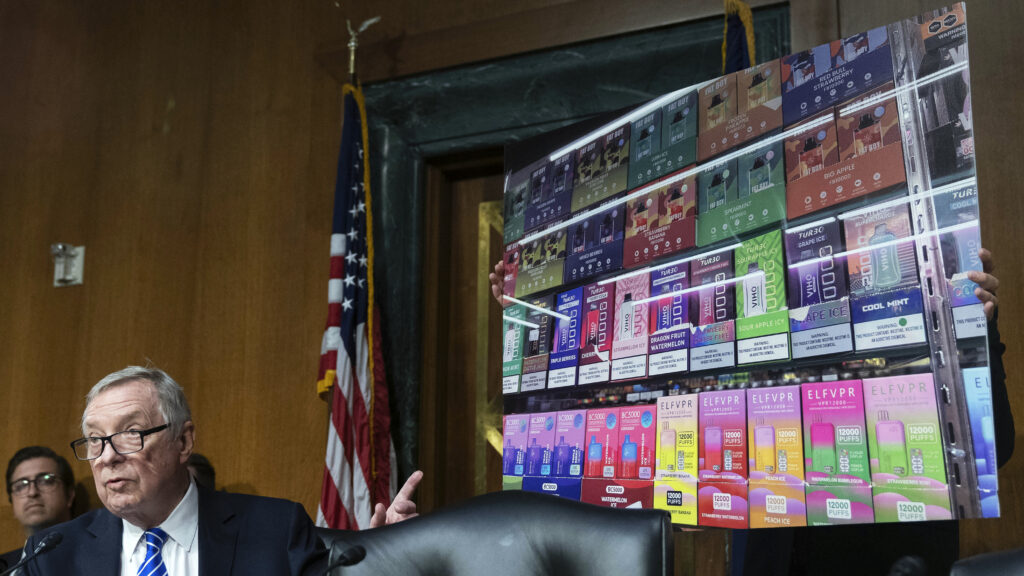WASHINGTON — The Food and Drug Administration and the Department of Justice claim they’re getting serious about clearing store shelves of illegal vapes.
Lawmakers made it clear Wednesday they aren’t buying it.
advertisement
During a Senate Judiciary Committee hearing, lawmakers came armed with illegal vapes purchased from convenience stores and gas stations, and even an oversized photo of a store near FDA’s headquarters stocked with illegal vapes.
“You’ve completely fallen down on the job,” Sen. Dick Durbin (D-Ill.), the chair of the committee and one of the Senate’s most vocal critics of the FDA’s approach toward vaping, lectured an agency official called to appear.
The criticisms didn’t just come from Democrats. Wednesday’s hearing was the clearest sign to date that both sides of the aisle have become fed up with the countless illegal vapes, also called e-cigarettes, lining convenience stores around the country. The FDA has only authorized the sale of 23 vape products. However, recent reports suggest more than 9,000 different vapes being sold in the U.S.
advertisement
Regulators from the FDA and DOJ who testified before the committee, for their part, argued that they have continually taken action against companies selling illegal products, but that they need additional resources to tackle the issue.
“I want to assure you that the FDA is committed to taking more … escalated enforcement actions in conjunction with our federal partners, but the road to get there is complicated,” said Brian King, head of the agency’s tobacco center. “FDA has received nearly 27 million … applications for e-cigarettes, which we are required by law to review. This, combined with a rapidly evolving tobacco product landscape, presents an unprecedented time and resource challenge that no other center at FDA has ever faced.”
The FDA announced earlier this week that it was standing up a task force with several federal law enforcement agencies to sweep the market of illegal vapes. But lawmakers on both sides of the aisle questioned why the FDA waited until now to create that group, given that an independent panel recommended the agency set up such a task force roughly a year and a half ago.
Republican Sen. Thom Tillis (N.C.) called the new task force a “thinly veiled political stunt.”
“What in the hell have you been waiting for?” asked Durbin.
Lawmakers of both parties appeared upset about the rise of illegal vapes for different reasons. While Democrats railed against what they saw as “Big Tobacco’s” efforts to addict children, Republicans complained that flavored vapes are being illegally imported from China.
The two most popular e-cigarettes among young people, according to a recent FDA survey, Elf Bar and Esco Bar, are both made in China. The third and fourth most popular are made by the U.S. companies R.J. Reynolds and Juul.
Sen. John Cornyn (R-Texas.) who brought a Mike Tyson-branded vape manufactured in China to the hearing, pointed out that vapes manufactured in China cannot be sold there because of a 2022 law that banned their sales domestically.
“You can’t sell them in China but you can sell them in the United States and essentially victimize and addict our children,” he said.
Ultimately little new information was gleaned Wednesday about the FDA’s approach to regulating illegal vapes. Nonetheless, it was a bruising experience for FDA and DOJ regulators, who frequently spoke in legalese, and could not explain to the satisfaction of lawmakers why illegal vapes remain on store shelves.
“You’re talking in circles and we can’t figure out what you’re doing,” said Marsha Blackburn (R-Tenn.).
King drew particularly strong ire for his seemingly contradictory arguments that the agency needs more time to review the applications submitted by vape companies before taking enforcement actions, while also arguing that products with pending applications are not allowed to be sold.
“What the hell are we talking about here?” asked Tillis. “Is this legal? Is it illegal?”
“Maybe we should go to the audience,” Tillis added, prompting laughs from a full congressional committee hearing room.
It’s unlikely to be the last public flogging for the FDA and DOJ, unless they begin to rapidly crack down on the countless stores selling these products – a largely impossible task without a massive influx of funding and workers.
But one action in particular may satisfy the FDA’s biggest critic in Congress.
“We are going to give you the address of the store that has the products here,” Durbin said, referring to his jumbo photo of a vape shop’s wares. “It’s in Silver Spring, Maryland, within 1 mile of FDA headquarters.”
“I hate to pick on one store,” he added. “But I want you to prove to me that it is urgent.”

